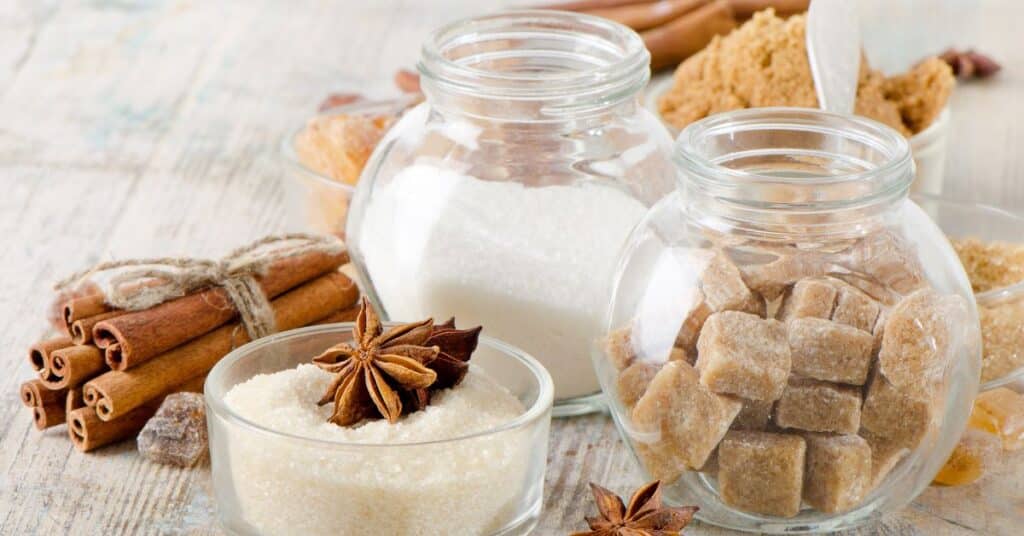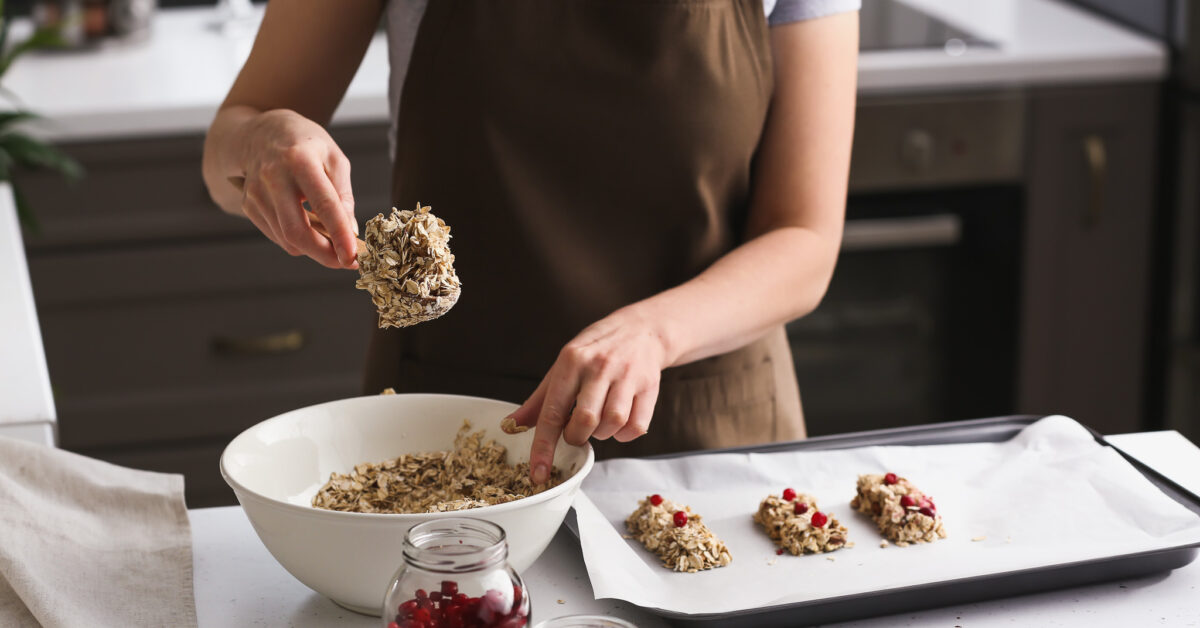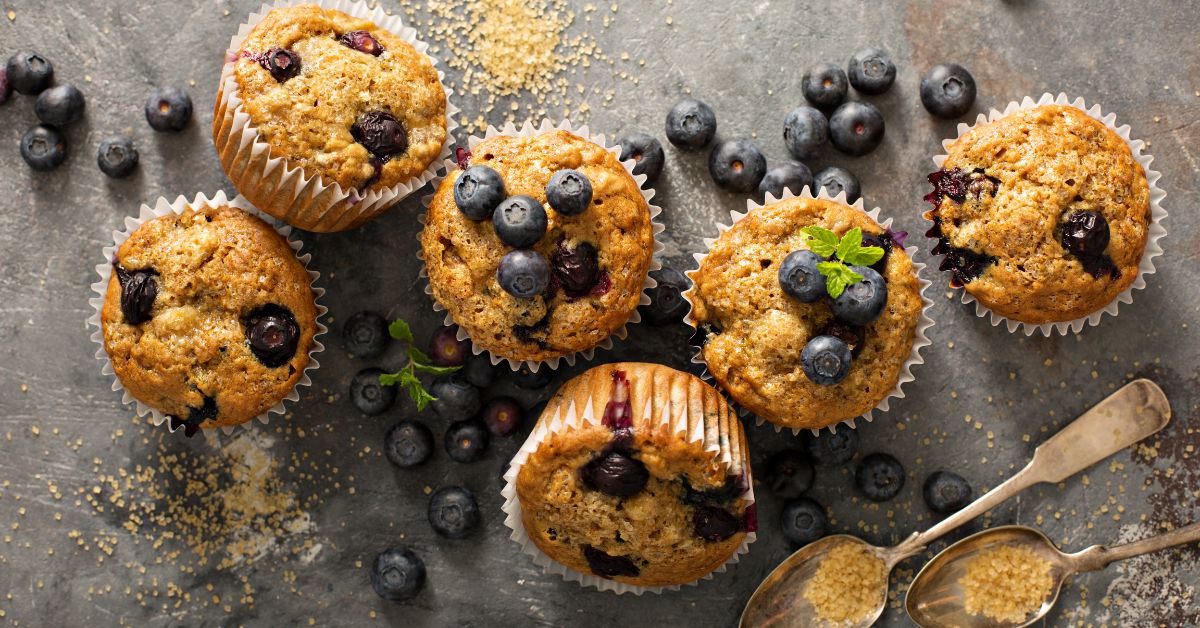

Can you still have sugar with a whole food, plant-based (WFPB) lifestyle? Yes . . . and no.
Confused? You’re not alone. Many people who are completely new to the plant-based lifestyle wonder about sugar: whether it’s recommended to avoid it completely, what the different levels of processing mean for health, and the role of more natural sources of sugar, like fruit.
Let’s break this down.
When it comes to a WFPB lifestyle, refined sugars like high fructose corn syrup and white sugar are off the table. These are highly processed and devoid of nutrients and fiber, which help to regulate blood glucose levels.[1]
What can you use instead to sweeten your food? Options like brown rice syrup, maple syrup, and raw local honey are more natural and less refined; however, they’re not technically whole foods, and honey isn’t vegan, if that’s important to you.
If you’re hoping to stay more strictly WFPB, choose whole food sources of sugar like homemade date paste or syrup, dried fruits, fruit purees like unsweetened applesauce, or mashed bananas. These are the kinds of ingredients we use to sweeten our food at MamaSezz.
The Full Sugar Story
Having covered the essentials, let’s get into some of the more granular details.
Refined and added sugar consumption in the United States is off the charts. The average daily intake of added sugars in US adults (over twenty years old) was seventeen teaspoons in 2017–2018.[2] The health consequences—from chronic inflammation and heart disease to obesity and cancer—are severe. But it’s not all doom and gloom! You can join the small minority who consume far fewer than seventeen teaspoons of added sugars, and you can indulge your sweet tooth while sustaining a WFPB lifestyle.
Why No Refined Sugar?
Most refined sugar comes from either sugar cane or sugar beets. Sounds pretty darn plant-based, doesn’t it? Not so fast. To make these refined sugars, everything goes through an extraction and purification process, and the fiber and nutrients of the sugar cane or sugar beet are lost. Remember, fiber stabilizes blood glucose levels by slowing the rate of absorption of sugar into your bloodstream.[1]
This lack of fiber in refined sugars is why your energy spikes and dips when you drink a soda, but not when you eat a whole food, like a banana (which has around eighteen grams of natural sugar).[3] The fiber in the banana helps to regulate how your body processes this sugar and lets you use the energy in a more sustainable way. Plus, bananas and other whole foods are packed with nutrients that fuel the body and reduce your risk of developing the very same chronic conditions that refined sugar consumption is associated with, including obesity, diabetes, and heart disease.[2]
If you need any more reason to ditch the refined sugars, consider their addictiveness. (You can learn how to overcome your refined sugar addiction here.)
Read Nutrition Labels Carefully
A word to the wise: read nutrition labels! The food industry uses many names for refined sugar, and they’re not always obvious. Here are a few of the sneaky ingredients to look out for:
- sucrose
- glucose
- fructose
- maltose dextrose
- lactose
- high fructose corn syrup
- evaporated cane juice
- fruit juice concentrates
- cane crystals
- corn sweetener
How to Sweeten Foods on a WFPB Diet
Don’t worry—you can have your cake and eat it too. The solution isn’t eating bananas instead of cookies, although you may use bananas to sweeten those cookies. Trust us, it’s easy and delicious. More on that in a minute.
As mentioned before, there are two main schools of thought regarding which natural sweeteners are allowed in a WFPB lifestyle. We use the word allowed loosely. We don’t like to dole out rules; we just want to give you the best information to help you make the best choice for your health and lifestyle.
The first school of thought is that slightly refined natural sugars are okay in moderation. These include maple syrup, raw local honey, brown rice syrup, and blackstrap molasses. If you go this route, you can increase your fiber intake by adding ground flaxseed (which can also be used as an egg substitute when mixed with water), fruits, or whole grains to the mix.
Alternatively, you might choose to use only whole foods: dates and other dried fruits, date paste and syrup, and fruit purees (e.g., unsweetened applesauce, mashed bananas). You can make your own date syrup by blending soaked dates with water until you reach a smooth, syrupy consistency. Dates (like many dried fruits) are loaded with both fiber and natural sugar. They have a rich molasses-like taste that will give your dessert a unique flavor. You can also try making syrup from raisins or prunes for a more distinctive flavor.
Using whole foods as sweeteners has other benefits too. For example, bananas not only have eighteen grams of sugar but also act as a binder—making them perfect for tasty baked goods!
Life Beyond Refined Sugar
Once you’re off sugar, you’ll find that you don’t even want it. How is that possible? When you ditch sugar, your taste buds readjust such that, within less than two weeks, the taste of refined sugars may become too intensely sweet.[4] This taste bud reset makes staying off sugar that much easier and WFPB treats that much tastier.
This article was reprinted with permission from MamaSezz and edited in accordance with CNS editorial guidelines To learn more about this topic, check out some of our other resources:.
- Whole Food, Plant-Based Guide
- Is Fruit Healthy? Busting Common Fruit Myths
- Naturally Sweet—Cooking and Baking without Added Sugar
- CNS Kitchen Online Community
References
- US Centers for Disease Control and Prevention (CDC). Fiber: The carb that helps you manage diabetes. May 15, 2024. https://www.cdc.gov/diabetes/healthy-eating/fiber-helps-diabetes.html
- US Centers for Disease Control and Prevention (CDC). Get the facts: Added sugars. January 5, 2024. https://www.cdc.gov/nutrition/php/data-research/added-sugars.html
- FoodData Central. Bananas, ripe and slightly ripe, raw. US Department of Agriculture (USDA). https://fdc.nal.usda.gov/food-details/1105314/nutrients
- Precker M. How to make eating healthy easier? The answer may be on the tip of your tongue. American Heart Association News. January 29, 2024. https://www.heart.org/en/news/2024/01/29/how-to-make-eating-healthy-easier-the-answer-may-be-on-the-tip-of-your-tongue
Copyright 2026 Center for Nutrition Studies. All rights reserved.
Deepen Your Knowledge With Our
Plant-Based Nutrition
Certificate
Plant-Based Nutrition Certificate
- 23,000+ students
- 100% online, learn at your own pace
- No prerequisites
- Continuing education credits







